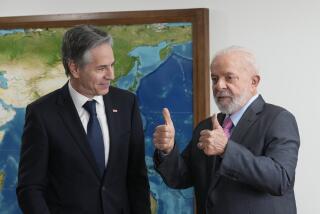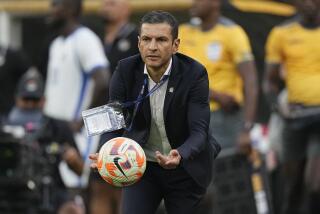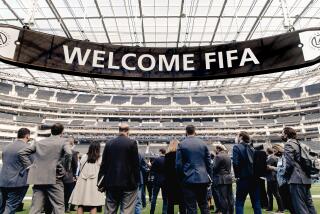With World Cup, Brazil shows its successes and shortcomings
When Brazil won the right to host soccer’s World Cup, the idea was to show the world a new country, a welcoming and capable place that had made great strides in growing its economy and reducing inequality.
Despite a few close calls, Brazil did manage to stage one of the world’s premier sporting events.
But image-building aside, the games also provided a good look at Brazil as it really is: a young democracy making strides on many fronts but still grappling with deep social problems and sparse services for its people.
As the country puts the World Cup behind it, those tensions will play out this fall in a presidential campaign and then in preparations for another huge global sporting event: the 2016 Summer Olympic Games. Many Brazilians say the conflicts that emerged in the months before the World Cup crystallized the issues the country faces.
“There are many Brazils inside of Brazil. And during the Cup, I think the world got a near-complete picture, from the hospitality of the people during a relatively successful event to all the problems we have that you would think have simple solutions,” said Jorge Diogo Souza Costa, who is finishing his business studies in Recife, which was among the host cities for the World Cup.
Politicians fell short, he added.
“They promised us a new country, and that obviously didn’t happen,” he said. “The negative reaction to that has totally changed the political discourse in the country, and topics like schools, transportation and healthcare, in contrast to the stadiums, have become commonplace.”
A police crackdown on a small protest against a bus fare hike in Rio de Janeiro last year brought more than a million people into the streets across the country.
Demonstrators took up a wide set of complaints, principally that the government had not provided adequate public services as the ranks of a new middle class had swelled during a decade of economic growth. To many, government services seemed especially meager compared with the country’s new, shiny and expensive soccer stadiums.
Although support for the World Cup in Brazil was initially very high, concern rose as it became clear that the tournament, spread among 12 cities, would be three times as expensive as the previous tournament in South Africa. Construction for the games was beset by cost overruns and accidents.
The government often reminded voters that the final bill was small compared with spending on health, education and infrastructure investments, which increased, not decreased, during that period. But the massive construction for the World Cup provided an all-too-obvious contrast with more prosaic problems, experts say.
“There was a widespread feeling that, if our country could create stadiums of that size and quality, then why couldn’t we also carry out other projects and public services that well?” says Laurindo Leal Filho, a sociologist at the University of Sao Paulo. “Now that the event was a success, which has been positive for the government, the population will have even greater demands for public projects and services.
“For both the government and the political opposition, the conversation has changed,” he said.
It is extremely unlikely that Brazil will choose to roll back the social programs pursued by the governing Workers’ Party for the last 12 years under President Dilma Rousseff and her predecessor, Luiz Inacio Lula da Silva.
Rousseff is ahead in the polls but could face a close election against Aecio Neves, who represents a party linked to the country’s traditional elite, and center-left politician Eduardo Campos. Both promise to maintain the Workers’ Party social programs, but are likely to hammer on allegations of corruption and mismanagement, including during preparations for the World Cup.
So far, the promise to effectively deliver government services has dominated the message from all three candidates.
In two years, Rio’s Barra da Tijuca neighborhood will host the Olympics. That area is close to the city’s infamous favelas, or slums, and attention is likely to focus on forced relocations and allegations of police violence against the poor, including cases of torture, killings and disappearances.
Rio police led a project to “pacify” the favelas, replacing the de facto rule by drug gangs with a government presence. But residents soon complained that instead of fully integrating them into society, the government sent heavily armed military police who treated them like criminals and did not hesitate to resort to violence.
In the last year, police killings in the favelas have become a rallying point for protests. And despite initial success for the program, crime and homicides have increased again in 2014.
Although the games were exciting, Brazilians who hoped to celebrate a championship were deflated by the play of their national team, particularly the shocking 7-1 loss in the semifinals to Germany.
But more broadly, preparations for the World Cup helped bring many long-standing issues into focus.
Maria Jorge da Silva, a 44-year-old housecleaner in Rio, acknowledged that she and her family are better off than before and that widespread discontent in her neighborhood became obvious only when the costs of the World Cup turned into a central issue last year.
“Who knows if the World Cup will be good or bad for our country overall? At the very least, we raised the flag that we were upset about certain things, and hopefully they have to pay attention,” she said. “We watched every game at my home and enjoyed it, but that didn’t mean we are satisfied.”
Juca Kfouri, a columnist and sports journalist based in Sao Paulo, said that compared with years ago, when Brazil was known mainly for its booming economy, or right before the Cup, when it was seen as a disorganized, discontented and violence-prone disaster, the country during the games was likely to have left foreigners with a balanced view.
Anderson Santos, 30, who manages gyms in apartment buildings in the small host city of Natal, said he hoped exposure to foreigners would encourage Brazilians to continue to fight for change.
“I saw so many people beating their fists on their chests, declaring they were patriots,” he said. “But what will make a difference is if they remain patriots in daily life after the games end.”
Bevins is a special correspondent.
More to Read
Start your day right
Sign up for Essential California for news, features and recommendations from the L.A. Times and beyond in your inbox six days a week.
You may occasionally receive promotional content from the Los Angeles Times.





